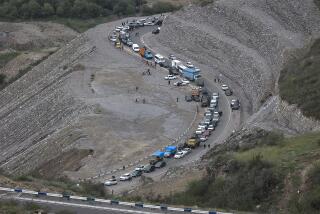‘Ethnic Strife’: Just a Cover for the Crushing Soviet Fist : Armenia: The peaceful pursuit of independence brought violent suppression.
- Share via
Last Saturday, Red Army paratroopers landed in and around Yerevan, the capital of Armenia. Their deployment coincided with a funeral for the 38 Armenian villagers shot down and mutilated by the soldiers of neighboring Azerbaijan just days before. Since then, Azerbaijani troops and their Moscow reinforcements have widened the attack and shelled numerous towns along the entire length of the Azerbaijani-Armenian border.
Gorbachev and his military commanders have warned the foreign media not to “misinterpret” their intervention in Armenia. The press in the United States has largely complied.
“The union is disintegrating,” say the Soviets. “Extraordinary measures are necessary.” The use of such sanitized terms as “interethnic strife” or “blood feud” between Muslim Azerbaijanis and Christian Armenians masks the sources of unrest--and the consequences. Whatever the religious differences and territorial disputes, Moscow has chosen to magnify and manipulate them deliberately.
The casualties lie only on one side. Armenia seeks to pursue the road to peaceful independence; Moscow, despite its accommodating language abroad, chooses to obstruct that road with guns, tanks and worse.
Since he became the first freely elected president of the Armenian Parliament last August, Levon Ter-Petrosyan has done his best to stay on Moscow’s good side. He has steered his nation toward democratic sovereignty, following the letter of the law on secession. Alone among the leaders of the six dissident republics, Ter-Petrosyan has observed all of the requirements of the Soviet constitution for a referendum on independence. He pursued quiet diplomacy toward the Kremlin, and in January actually volunteered his services as mediator in the Lithuanian crisis. Even more important, he reined in Armenian local militias, which had threatened to offer Gorbachev a pretext for intervention last summer.
Gorbachev has few friends remaining in Yerevan. His flagrant refusal to protect ethnic Armenians inside Azerbaijan from harassment and violence amounting to pogroms has wholly undermined his credibility in Armenia itself. The Armenian Communist Party has virtually disappeared, leaving Gorbachev without anyleverage in Yerevan. Azerbaijan, with its Communist Party still firmly in the saddle, provides an easy way for Gorbachev to exert pressure on Armenia.
In January the Azerbaijani Parliament announced its intention to deport the ethnic Armenian populations of the key border towns of Getashen and Martunashen. Both uniformed forces and Azerbaijani irregulars have escalated their raids on the villages, which are now reduced to rubble.
Moscow cynically portrays the Armenian villagers who have dared to defend themselves as “armed bandits.” It justifies the deployment of the Red Army, not only in the Azerbaijani border zone where the two villages are situated, but also inside Armenia, which had until now maintained an exemplary calm and sang-froid. Moscow formerly ignored Azerbaijani attacks on Armenians and Armenia itself. Now it aids and abets them and manufactures a cover-up abroad.
Independence for the republics on the Soviet periphery is often presented as a romantic dream, an atavistic urge, a return to 19th-Century-style nationalism. But for Armenia, only independence will ensure cultural--even physical--survival.
As the Armenian people have come to recognize since the first violent response to their democratic movement in February, 1988, the realistic choice now lies between independence and annihilation. Anything less than the autonomy of full sovereignty would leave the nation exposed and vulnerable to the machinations of Moscow.
Armenia represents about 1% of the Soviet land mass and population, and its reconquest should hardly prove necessary to ensure the viability of a restructured Soviet Union. But evidently Moscow is in no mood to take the long view.
Unless Western governments put pressure on Moscow, economic blockade and political terror will surely be Armenia’s portion in the months to come.
More to Read
Sign up for Essential California
The most important California stories and recommendations in your inbox every morning.
You may occasionally receive promotional content from the Los Angeles Times.













